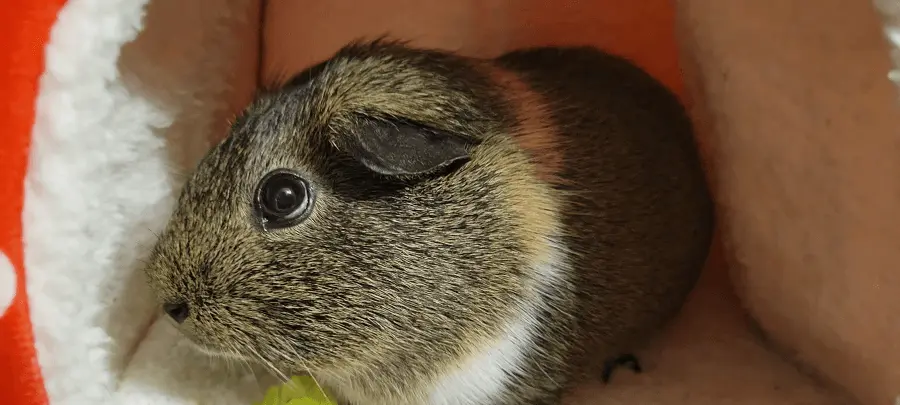Many people are drawn to guinea pigs for their adorable appearance, gentle nature, and playful personalities. They can be wonderful companions for individuals and families alike, but owning any pet is a significant responsibility.
Before you bring a guinea pig home, it’s crucial to understand their needs and ensure you can provide them with the proper care and attention they deserve.
This guide will answer some common questions and provide essential information to help you make an informed decision and prepare for the exciting journey of guinea pig ownership.
What I Wish I Knew Before Getting a Guinea Pig
- Time commitment: Unlike some small animals, Guinea pigs require significant daily care and attention. They need to be fed twice a day, their cage needs to be cleaned regularly, and they need time outside their cage to exercise and socialize. Be prepared to dedicate at least 1 hour daily to your guinea pig’s needs.
- Social needs: Guinea pigs are highly social creatures who thrive in the company of their kind. Keeping a lone guinea pig can lead to loneliness, boredom, and behavioral problems. Ideally, you should adopt two guinea pigs of the same sex to provide them with companionship.
What Should a First-Time Guinea Pig Owner Know?
Aside from the time commitment and social needs discussed earlier, several key factors require your attention as a first-time guinea pig owner:
Basic Needs
- Diet: Guinea pigs have specific dietary requirements. They need unlimited access to high-quality hay, which should be their primary food source. Additionally, please provide them with a daily serving of fresh vegetables and high-quality guinea pig pellets.
- Housing: The cage should be spacious enough for your guinea pigs to move around comfortably. A minimum of 8 square feet per guinea pig is recommended, with larger cages being even better. Choose a cage with a solid bottom and avoid wire mesh flooring, which can hurt their delicate feet.
- Bedding: Opt for absorbent, dust-free bedding like wood shavings or paper pellets. Avoid cedar shavings, as they can cause respiratory problems.
- Hidey-places: Guinea pigs are prey animals and need places to hide and feel secure. Provide them with multiple hidey-places, such as tunnels, boxes, and enclosed huts.
- Toys and enrichment: Guinea pigs are naturally curious and need mental stimulation. Provide them with a variety of safe toys to chew, dig, and explore. Rotate their toys regularly to keep them engaged.
Handling and Socialization
- Start slowly and gently: Gain your guinea pig’s trust by allowing them to approach you and offering treats. Handle them with care and avoid sudden movements that might frighten them.
- Bonding activities: Spend time each day interacting with your guinea pigs. Hand-feed them, talk to them softly, and provide them with gentle petting. This will help you build a strong bond and create a happy and trusting relationship.
Health Care
- Find a cavy-savvy vet: Choose a veterinarian who is experienced in treating guinea pigs. Regular checkups are crucial for preventive care and early detection of any health problems.
- Learn about common guinea pig illnesses: Familiarize yourself with the signs and symptoms of common guinea pig illnesses, such as respiratory infections, dental problems, and skin conditions. This will allow you to seek prompt medical attention if necessary.
- Quarantine: If you are adding a new guinea pig to your existing group, quarantine them for at least two weeks to prevent the spread of any potential diseases.
Preparing Your Home
- Guinea-proofing: Guinea pigs are curious and can get into trouble if unsupervised. Ensure your home is guinea-proof by securing electrical cords, removing poisonous plants, and blocking off any potential hiding places that could be dangerous.
- Safe playtime: Provide your guinea pigs with a safe and enclosed area for supervised playtime outside their cage. This will allow them to exercise and explore their surroundings.
Understanding these essential aspects of guinea pig care can create a loving and comfortable home for your furry friend. Remember, responsible pet ownership requires commitment, knowledge, and a willingness to provide your guinea pig with the best possible care.
What is the Best Age to Adopt a Guinea Pig?
Choosing the right age for your guinea pig can significantly impact your experience and theirs. Each age group has its unique advantages and considerations:
Young Guinea Pigs (4-8 weeks)
- Advantages: Highly adaptable and easy to socialize with other guinea pigs of similar age.
- Considerations: Require more frequent feeding (4-5 times per day) and closer monitoring. May be more susceptible to certain illnesses.
Adolescent Guinea Pigs (2-6 months)
- Advantages: More independent and may already be bonded with other guinea pigs. Can be more active and require more space for exercise.
- Considerations: May be more challenging to socialize with other guinea pigs if not already bonded. Personalities may not be fully developed.
Adult Guinea Pigs (over 6 months)
- Advantages: They can be easier to handle and may have established personalities, making choosing one that fits your lifestyle easier. Often calmer and more relaxed.
- Considerations: May be more difficult to introduce to other guinea pigs. May be less playful and active than younger guinea pigs.
Ultimately, the best age for your guinea pig depends on your preferences and circumstances. When deciding, consider your lifestyle, experience level, and availability to provide appropriate care.
Additional Factors to Consider
- Sex: Male guinea pigs require more space and may be more territorial than females. Neutering can help to reduce aggression.
- Breed: Different breeds have varying temperaments, activity levels, and grooming needs. Research different breeds to find one that suits your preferences.
- Personality: Observe the individual guinea pig’s personality during adoption. Choose one that appears healthy, active, and friendly.
By taking these factors into account, you can choose a guinea pig at an ideal age for a happy and fulfilling relationship for both of you.
What to Expect When You First Bring a Guinea Pig Home
Bringing home your new guinea pig is an exciting moment, but it’s important to be prepared for the initial adjustment period. Here’s what you can expect:
Setting up the Environment
- Have everything ready before bringing your guinea pig home. This includes their cage, food, water, hay, bedding, hidey-places, toys, and safe exercise space.
- Place the cage in a quiet and well-lit location away from drafts and direct sunlight.
- Allow your guinea pig to explore their new environment at their own pace. Avoid disturbing them or forcing interaction.
Acclimatization Period
- Give your guinea pig time to adjust to their new surroundings. This process can take several days or even weeks.
- Provide them with plenty of hiding places to feel secure and comfortable.
- Monitor their behavior for signs of stress, such as hiding, decreased appetite, or lethargy.
Building Trust
- Start building trust with your guinea pig by offering them treats through the cage bars.
- Gradually progress to hand-feeding and eventually picking them up for short periods.
- Use positive reinforcement to reward good behavior and avoid punishment, which can damage your bond.
Monitoring Behavior
- Keep a close eye on your guinea pig’s behavior and ensure they are eating, drinking, and using the bathroom normally.
- Be familiar with signs of illness, such as weight loss, changes in appetite, or difficulty breathing.
- If you notice any concerns, don’t hesitate to consult a cavy-savvy veterinarian.
Enjoying Your New Furry Friend
- Once your guinea pig is settled and comfortable, start introducing them to playtime outside their cage.
- Supervise them closely to prevent accidents and ensure they have a safe and enriching environment.
- Spend time interacting with your guinea pig each day. Talk to them, groom them, and offer them gentle pets.
- Watch their personalities unfold and enjoy the joy and companionship they bring to your life.
Remember, patience and understanding are key during the initial adjustment period. By creating a loving and comfortable environment and slowly building trust, you can establish a strong bond with your new guinea pig and embark on a rewarding journey together.
Beyond the Basics of Guinea Pig Care
Now that you’ve welcomed your guinea pig home and understand their basic needs, let’s delve deeper into ongoing care and responsibilities for a long and happy life together:
Diet and Nutrition
- Guinea pigs are herbivores and require a specific diet to thrive. Ensure they have unlimited access to fresh, high-quality hay like Timothy hay or orchard grass.
- Provide a daily serving of fresh vegetables like bell peppers, romaine lettuce, and carrots. Wash vegetables thoroughly to remove any pesticide residues.
- Offer high-quality guinea pig pellets in a measured amount daily. Avoid overfeeding pellets, as they can contribute to obesity and health problems.
- Supplement their diet with a vitamin C source daily, as guinea pigs cannot synthesize their own. Consult your veterinarian for recommendations on suitable supplements.
Cleaning and Hygiene
- Spot-clean the cage daily to remove any waste or soiled bedding.
- Perform a full cage cleaning at least once a week. This involves removing all bedding, washing the cage with warm, soapy water, and replacing the bedding with fresh material.
- Trim your guinea pig’s nails regularly to prevent them from becoming overgrown and uncomfortable. Ask your veterinarian or a groomer for assistance if needed.
- Maintain good hygiene by washing your hands after handling your guinea pig and cleaning their cage. This helps prevent the spread of bacteria and promotes good health for both you and your pet.
Enrichment and Activity
- Guinea pigs are naturally curious and need mental stimulation to prevent boredom and frustration.
- Provide them with a variety of safe and engaging toys such as chew toys, tunnels, hidey-places, and foraging balls.
- Rotate their toys regularly to keep them interested and engaged.
- Offer them opportunities for supervised playtime outside their cage in a safe and enclosed area. This allows them to exercise, explore, and socialize with you.
Health and Wellness
- Schedule regular checkups with your cavy-savvy veterinarian for preventive care and early detection of any health problems.
- Familiarize yourself with common guinea pig illnesses such as respiratory infections, dental problems, and skin conditions.
- Monitor your guinea pig’s behavior and appearance for any changes that might indicate illness.
- Don’t hesitate to seek prompt veterinary care if you notice any concerns.
Building a Strong Bond
- Spend quality time with your guinea pig each day. Interact with them through gentle handling, hand-feeding, and playtime.
- Talk to them in a soft voice and offer them positive reinforcement for good behavior.
- Observe their body language and learn to understand their communication cues.
- Building a strong bond requires patience, consistency, and love. With time and effort, you can create a lasting and meaningful relationship with your furry friend.
Additional Resources
- American Cavy Breeders Association: https://www.acbaonline.com/
- Online forums and communities
- Books and websites dedicated to guinea pig care
By providing your guinea pig with the proper care, attention, and love, you can ensure they live a happy and healthy life for many years. Remember, informed ownership and ongoing commitment are essential for creating a positive and enriching environment for your furry companion.
Conclusion
Owning a guinea pig can be a truly enriching and rewarding experience. Their gentle nature, playful personalities, and unique quirks bring joy and laughter to many homes. However, responsible pet ownership requires dedication, knowledge, and a commitment to providing your furry friend with the best possible care.
By following the information and guidance provided in this article, you can embark on a rewarding journey with your guinea pig. Remember to prioritize their basic needs, including diet, housing, exercise, and veterinary care.
Embrace their curious nature and provide them with enriching activities to keep them stimulated and happy. Most importantly, build a strong bond through gentle interaction, positive reinforcement, and endless love.

